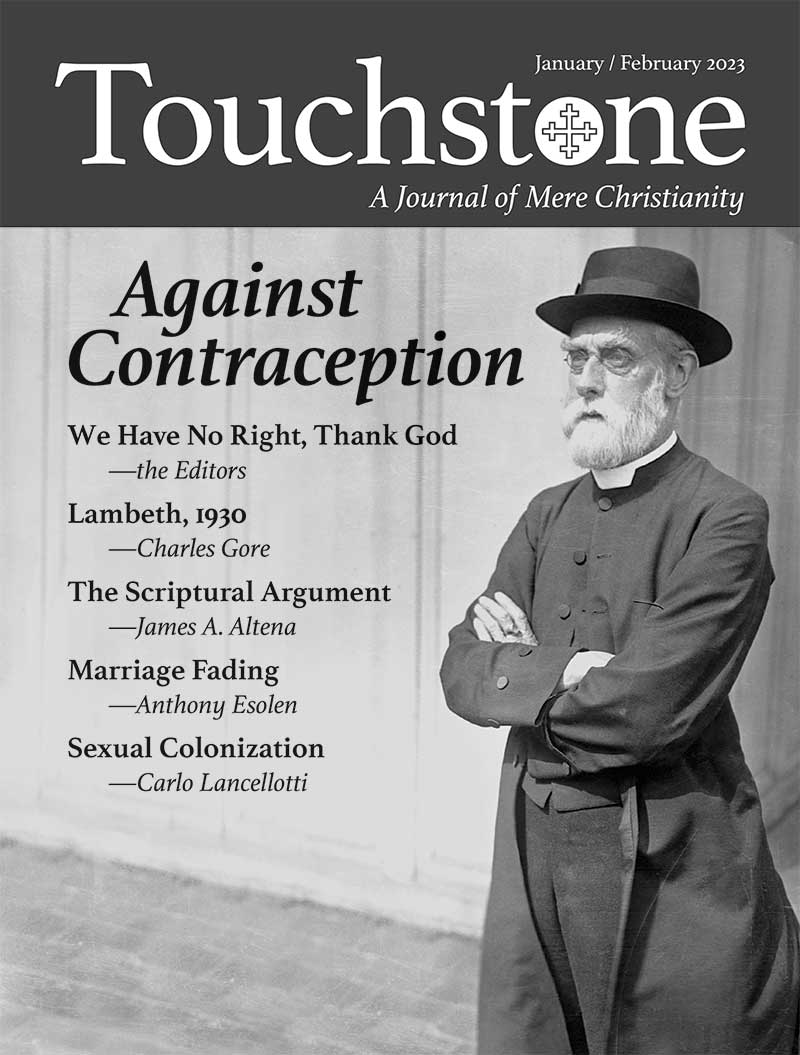Against Contraception
We Have No Right, Thank God
Do not be proud of the fact that your grandmother was shocked at something which you are accustomed to seeing or hearing without being shocked. . . . It may be that your grandmother was an extremely lively and vital animal, and that you are a paralytic. —G.K. Chesterton
Last year, I had the pleasure of sitting beside a young father at a Philadelphia Society dinner in Fort Worth, Texas. The young man knew of our journal, and he asked what unified our editors, despite our denominational differences. He was Roman Catholic and a father of five, so I decided to go in hot. But he did not so much as raise an eyebrow when I told him, “Well, we all oppose contraception and the ordination of women.”
“I never saw the problem with contraception until I got to [Harvard] law school,” he said. Harvard Law School had something to say against contraception? “No, it was when we covered Griswold. We were all amazed to learn that as late as 1965, yesterday really, people thought contraception was bad. Maybe it was accepted by many or even most people by then, I don’t know, but it wasn’t considered a good thing. I just started thinking about it. How could it go from bad to good?”
Good question! How could it? Surely there was some great discovery or something new about the human condition today that we simply didn’t know in 1965—or in 1925, when every Catholic, Protestant, and Eastern Orthodox church in the world regarded contraception as morally illicit (for those who want to understand why the entirety of Christendom was unified against contraception, we point you to James Altena’s feature in this issue).
Maude, 1972
In the 1970s, Norman Lear dominated American television with a string of politically charged sitcoms that promoted progressive thinking, beginning with All in the Family (and with only three channels to choose from in those days, if it was on network television, you probably watched it). In 1972, Lear took a $10,000 payment from Dr. Paul Ehrlich’s Zero Population Growth organization to produce an episode of a sitcom that would promote Ehrlich’s goal of zero population growth.
By 1972, contraception was too passé for Lear and his first All in the Family spinoff, Maude, so he scripted a comedic take on contraception’s first big spinoff sensation and backup plan: legalized abortion. Hi-larious! Cue the laugh track machine! (an invention without which no one today would even know the name Norman Lear). Future contraception spinoffs would include the fatherless home, the collapse of American fertility, the redefinition of marriage, Pornhub, the weaponization of the LGBT movement, and so on, but more on all this later.
In the episode, Maude (played by the 50-year-old Bea Arthur), discovers she is pregnant by her fourth husband. Her daughter Carol implores her to get an abortion, saying, “When you were young, abortion was a dirty word; it’s not anymore. Now you think about that.” Think about what, exactly? Carol didn’t say how abortion could go from bad to good, but she assured her mother that getting an abortion today “was like going to the dentist.” Apparently, it was the ease with which one could commit an evil act that had transformed something bad into something good—that, and the pop-culture imprimatur from the long-since discredited work of Dr. Paul Ehrlich, Norman Lear, and CBS. Three months later, the Supreme Court would issue its Roe v. Wade decision, mandating legalized abortion in every state, and within ten years the number of abortions performed annually in the United States would more than double.
The abortion explosion came as a shock to no one. By the 1970s, our public schools taught every American child that good sex, safe sex = contraception, and that bad sex, dangerous sex = baby. And every junior high school kid understood that this good, safe, righteous sex their teachers were teaching them to practice was not married sex. (Oh, but hey, if you think, um, “fornication”—ha!—makes Jesus sad, then it’s perfectly fine for you to stay home and watch Donny and Marie with your parents, precious.)
So why, in the words of the cool President Obama, should anyone be “punished with a baby” for practicing good, safe, responsible, premarital sex as their teachers instructed? If premarital sex and contraception are morally good, and a baby is bad, then how on earth could abortion be bad? So abortions doubled. What did we think was going to happen?
Humanae Vitae, 1968
Still, when looking back on the Supreme Court’s Griswold decision from his Harvard classroom, my dinner companion and his classmates might have plausibly wondered whether contraception wasn’t really a good idea. After all, in 1960 women were having a lot of children, and the illegitimacy rate of 5.3% was on the rise. If the Pill, introduced that year, could reduce that number, wouldn’t it all be for the good?
Two points. First, as Pope PaulVI reminded us in his 1968 encyclical condemning contraception, Humanae Vitae, “it is never lawful, even for the gravest reasons, to do evil that good may come of it.” Second, no good came of it.
In 1960, the year the FDA approved the Pill, the average American household produced a healthy 3.55 children per family. Sixty-two years later, the American fertility rate has fallen to a demographically suicidal 1.6 children per household, while for the comparatively tiny number of children today who do make it to term, the illegitimacy rate has risen from 5.3% to 40% (48% in the U.K., 55% in Sweden, 60% in France, 71% in Iceland). Why, at this point, should anyone expect a father to stick around? It’s been thirty years since Vice President Dan Quayle was roundly condemned for suggesting that the television show Murphy Brown was wrong to lionize contraceptive culture’s greatest American hero, the single mother. And in 2015, Justice Anthony Kennedy made it clear in his Obergefell decision redefining marriage that anyone who thinks it is in the best interest of every child to have a mom and a dad is a bigot.
Whom did we think we were kidding all this time? After all, contraception elevates and celebrates the separation of sexual pleasure above its natural purpose. Did anyone ever seriously believe that a hyper-sexualized contraceptive culture would be good for children or families? Of course not. And that is why, up until pretty much the day before yesterday, everyone—not just the churches—was against it. As Allan Carlson has recounted in these pages on multiple occasions (“Pure Visionary” inJune 2009, “Sanger’s Victory” inJanuary/February 2011, and “Moral Kombat” inSeptember/October 2022), opposition to contraception (and pornography) stood in defiance of virtually no one. It was opposed by Democrats and Republicans alike. The nation’s leading businessmen were unified against it. The presidents of Amherst, Yale, Brown, and Dartmouth all served as vice presidents in the New England Society for the Suppression of Vice. In 1931, The Washington Post wrote that contraception would “sound the death-knell of marriage as a holy institution” (more from that editorial below), and it was even opposed by nineteenth-century feminists like Elizabeth Cady Stanton, who saw pornography, abortion, contraception, and the abuse of women as all of a piece.
And what has the LGBT movement of these last twenty years been about but the militant imposition of the same contraception theme, separating and elevating sexual pleasure, not only above its natural purpose, but above all else?
Looking back at Humanae Vitae in 1993, twenty-five years after its publication, Janet Smith at the University of Dallas identified four things that Pope PaulVI prophesied would follow from the West’s ascendant contraceptive culture: (1)a general moral decline; (2)aloss of respect for women; (3)the abuse of power by the state; and (4)the emergence ofman’s belief that he had total dominion over his own body.
Pope Paul could not have known in 1968 that his fourth point would manifest itself in the chemical and surgical mutilation of healthy children through “sexual transitioning,” or that his third point would bring on the government redefinition of marriage and state-sponsored “Pride” marches, or that his second and third points would mean that women would no longer have access to their own bathrooms or sports competitions. Again, let’s stop kidding ourselves—all of these horrors were built atop the foundation of our contraceptive culture, and not one of them would be embraced today without it.
Lambeth, 1930
In 1920, the Lambeth Conference of the Anglican Communion came down hard against the use of contraceptives under any and all circumstances. Ten years later, in Resolution 15 in the final report of the Lambeth Conference of 1930, the Anglican Communion became the first and only church in the world to countenance circumstances allowing for the use of contraceptives between married persons only. But even then, the Bishop of London declared, upon reading the Lambeth resolutions as a whole, that he was convinced the bishops had spoken “on the side of strictness” against contraception. Resolution 15 provided just a smidgeon of wiggle room . . . for married couples only . . . and only under special circumstances . . . and just . . .
“I fear this is practically the exact opposite of the truth,” replied the former Bishop of Oxford, Charles Gore, who saw the camel’s nose under the tent at Lambeth. Even the Washington Post couldn’t believe what it was seeing. Its March 22, 1931 editorial lambasted the approval of the Lambeth resolutions by the Federal Council of Churches in America (forerunner of the National Council of Churches): “the committee’s report, if carried into effect, would sound the death-knell of marriage as a holy institution, by establishing degrading practices which would encourage indiscriminate immorality. The suggestion that the use of legalized contraceptives would be ‘careful and restrained’ is preposterous.”
For those who still can’t imagine, in this day and age, how anyone could oppose the use of contraceptives, we have reprinted Bishop Gore’s 1930 tour de force, “Lambeth on Contraceptives,” in this issue. Anthony Esolen had this to say about it: “I think that, as so often, what is written when a controversy begins is more cogent, of broader vision, and more keenly focused on fundamental questions than what comes later, when the muddle of human affairs and self-justifications come into play.”
The editors of Touchstone can hardly wash their hands of this. The scorn heaped above we heap upon ourselves because, at various points in our lives, most of us thought that contraception was fine and sensible. But then we never could answer how something bad could become good.
And even if we wanted to throw in the towel and rejoin the madding crowd, Charles Gore reminds us that this is not a decision we have the authority to make:
[I]f the Church has been slack in the past . . . it is still its business . . . under persecution or unpopularity to consolidate the faithful remnant, who are to nourish their souls in the readiness to suffer with Christ and in the secret security of final victory in Him. We have no right to sanction the “second best.”
J. Douglas Johnson is the executive editor of Touchstone and the executive director of the Fellowship of St. James.
subscription options
Order
Print/Online Subscription

Get six issues (one year) of Touchstone PLUS full online access including pdf downloads for only $39.95. That's only $3.34 per month!
Order
Online Only
Subscription

Get a one-year full-access subscription to the Touchstone online archives for only $19.95. That's only $1.66 per month!
bulk subscriptions
Order Touchstone subscriptions in bulk and save $10 per sub! Each subscription includes 6 issues of Touchstone plus full online access to touchstonemag.com—including archives, videos, and pdf downloads of recent issues for only $29.95 each! Great for churches or study groups.
Transactions will be processed on a secure server.
more on family from the online archives

31.5—September/October 2018
Errands into the Moral Wilderness
Forms of Christian Family Witness & Renewal by Allan C. Carlson
more from the online archives
calling all readers
Please Donate
"There are magazines worth reading but few worth saving . . . Touchstone is just such a magazine."
—Alice von Hildebrand
"Here we do not concede one square millimeter of territory to falsehood, folly, contemporary sentimentality, or fashion. We speak the truth, and let God be our judge. . . . Touchstone is the one committedly Christian conservative journal."
—Anthony Esolen, Touchstone senior editor












